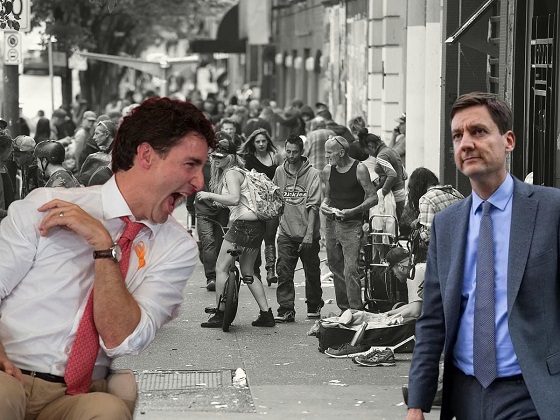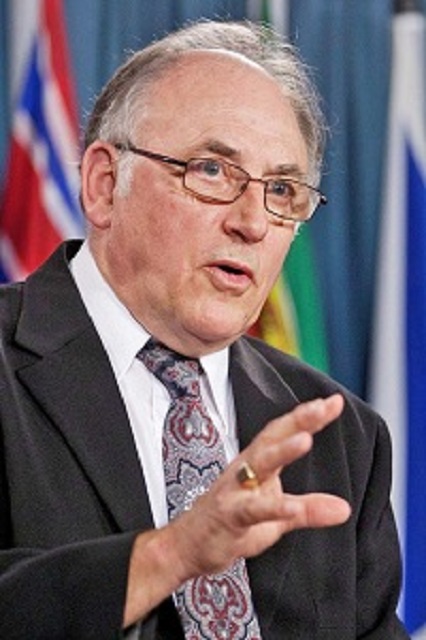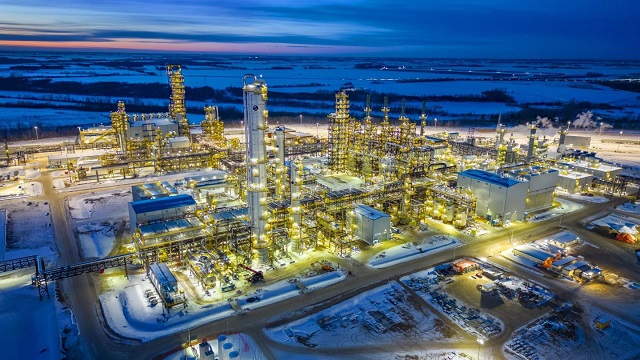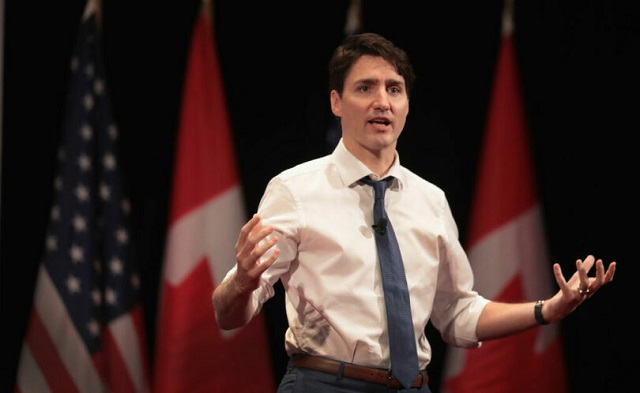Economy
Biden Is Failing The World
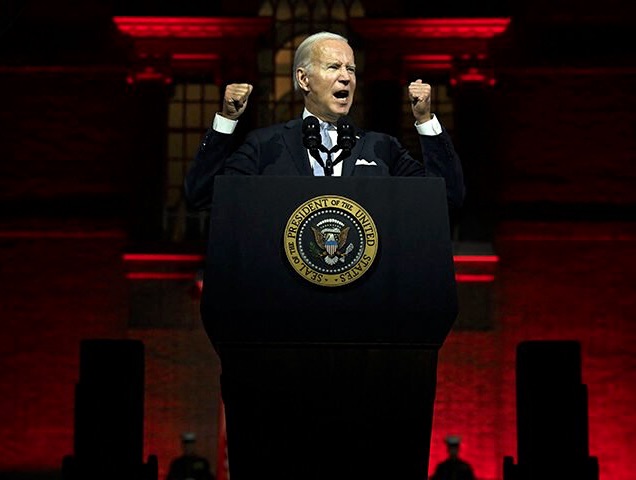

You can see that in Poland people are actually burning trash to stay warm. Burning trash in your fireplace creates toxic smoke. It’s hazardous. The government’s considering handing out masks so people can breathe more safely when they’re outdoors.
Recall that natural gas is the reason the United States reduced its carbon emissions more than any other country in the world. Carbon emissions have been on the decline globally, in large measure, because of the transition from coal to gas. Natural gas is something that most reasonable people agree is a superior fuel to coal. Natural gas is the reason the United States reduced its emissions by 22% between 2005 and 2020, which is five percentage points more than the United States had agreed to reduce our emissions under cap and trade legislation, which nearly passed Congress in 2010 and under the UN Paris Climate Agreement.

The above is a graph that was produced by Matthew Yglesias, a well-known progressive blogger. He tweets it out whenever somebody points out that President Biden isn’t doing all he can to expand oil and gas production. It’s accurate. It does show that oil production increased on a daily average under Biden from under Trump. But it’s deeply misleading. You have to remember that under Trump, the Coronavirus pandemic, for several months, massively slashed oil production.
You can see from the below chart of the EIA data on crude oil production that we still haven’t gotten back to where we were before the pandemic. Now consider how the need is much greater for US oil now that Europe and the United States are rejecting Russian oil.Upgrade

The United States is the biggest liquified natural gas exporter, it’s true. But it takes five years to bring online new LNG capacity in the United States. So all of the new LNG that’s come online during Biden’s presidency was due to past presidents.
And Biden has leased less land than any President since World War II. It’s a shockingly small amount of land: 130,000 acres as opposed to seven million acres under Obama, four million acres under Trump, during the first 19 months of their administrations. It’s a huge reduction in the amount of land being leased.
You can see that in some particular cases, like a very large oil and gas sale in Alaska, the Department of Interior claimed there wasn’t any industry interest in the lease. This turned out not to be the case. The Senator from Alaska, Lisa Markowski said, “I can say with full certainty based on conversations as recently as last night, that Alaska’s industry does have an interest in lease sales and the Cook Inlet to claim otherwise is simply false, not to mention stunningly shortsighted.”

People point out the oil and gas industry does have many thousands of leases, and that’s true, but there’s a high degree of uncertainty about whether the leases they have will produce oil and gas at levels that make sense economically to produce from.
So increasing oil and gas leasing at a time of an energy crisis in Europe seems like a no-brainer, but the Biden administration is not doing that. In fact, it’s been preventing the expansion of gas in many other ways.
You can see the Biden administration denied a request to have a formaldehyde regulation exempted. All else being equal, you’d wanna reduce that pollution. But I think a little bit of formaldehyde is gonna be a less toxic airborne event than having people breathing toxic wood and plastic smoke in Europe. The right thing to do, in terms of aiding our allies, would be to wave that regulation. But the Biden administration refused.

You can see that the Biden administration is actively considering forgoing all new offshore drilling in the Atlantic and Pacific. It may do no offshore leases at all for oil and gas.
Instead, the Biden administration has sought to give sanctions relief to Venezuela in the hopes that Venezuela would produce more oil. And of course, most famously Biden went to Saudi Arabia to ask the Saudis to produce more oil in July. Now, everybody agrees that was a huge foreign policy failure. The Saudis announced they would be cutting production with the rest of OPEC+. The Biden administration’s pressure on the Saudis apparently annoyed them. Now, they’ve been pushed closer into the arms of Russia. This is a pretty significant setback for the Biden administration.
At the same time Biden was going to Venezuela and Saudi Arabia to produce more oil. Biden administration was refusing to even meet with oil and gas executives. That’s a pretty serious snub when you consider that it’s an industry you want to expand production.
An oil and gas analyst on Twitter criticized a Senator from Wisconsin for suggesting the Democrats are responsible for the lack of refining capacity. He said, “What — do you also blame a political party for a flat tire?”
I pointed out that a single oil refinery outage would have little impact if we had sufficient refinery capacity, and the reason we don’t is that politicians, mostly Democrats have used regulations to prevent their construction. When I interviewed executives one said to me, “If you were an oil company, why would you invest hundreds of millions of dollars into expanding refining capacity if you thought the federal government would shut you down in the next few years? The narrative coming out of this administration is absolutely insane.”

So you can see here that refinery capacity was increasing all the way through 2020. It then declined due to the pandemic. And it has not risen since then. When the analyst was asked, why don’t we get more refineries? He clearly didn’t know. Or at least he said he didn’t know. But it’s clear the Biden administration has not wanted more refineries.
There was a chance to retrofit a major refinery in the US Virgin Islands. It was a refinery that was older. It needed pretty significant upgrades. It was polluting. But these are machines that can be fixed. Several billion dollars of investment would’ve fixed it and it goes back many years. This is an article from 2008. It describes how, at that time, the Democrats in the Senate killed a proposal for refinery expansion.
Go back to 2006. The same thing happened. The House was in the hands of the Republicans who passed a piece of legislation to expand refineries. And it was the Democrats who killed it. And, incidentally, they’re using the exact same arguments today that they used back then.
More recently, we’ve seen an attack on expanded natural gas pipeline capacity, including from Pennsylvania to the Northeast, particularly to Boston. The result of not having pipeline capacity is that they’ve been burning more oil for electricity in New England. In fact, oil-fired power jumped to a four-year high earlier this year. And they’ve been having to import liquified natural gas to New England rather than just pipe it in, which is significantly cheaper. Probably half as expensive.

Grassroots advocacy and lawsuits have prevented pipelines from being built. You can see there’s a strong correlation between the price of natural gas and the ability to get pipelines built. We stop building pipelines and gas gets more expensive. Globally, the impact is that we’re gonna return to coal. This is the consequence of stifling oil and gas production.
One could argue that we just need more scarcity in order to accelerate the transition to electric cars. But it’s notable that the major figures in this, including President Biden, supporters of President Biden, and representatives of his administration aren’t defending a pro-scarcity position. They’re instead claiming that they’re doing all they can to bring down oil and gas prices and expand production.
I think this data, and the historical chronology, paint a picture that shows that there has, in fact, been a war on natural gas and oil United States and that it is impacting global supplies, and leaving Europe vulnerable.
Click to see the video presentation of this article. Additional slides and graphs are in the video.
Subscribe to Michael Shellenberger
Reporting on cities, energy, and the environment
Business
Taxpayers criticize Trudeau and Ford for Honda deal

From the Canadian Taxpayers Federation
Author: Jay Goldberg
The Canadian Taxpayers Federation is criticizing the Trudeau and Ford governments to for giving $5 billion to the Honda Motor Company.
“The Trudeau and Ford governments are giving billions to yet another multinational corporation and leaving middle-class Canadians to pay for it,” said Jay Goldberg, CTF Ontario Director. “Prime Minister Justin Trudeau is sending small businesses bigger a bill with his capital gains tax hike and now he’s handing out billions more in corporate welfare to a huge multinational.
“This announcement is fundamentally unfair to taxpayers.”
The Trudeau government is giving Honda $2.5 billion. The Ford government announced an additional $2.5 billion subsidies for Honda.
The federal and provincial governments claim this new deal will create 1,000 new jobs, according to media reports. Even if that’s true, the handout will cost taxpayers $5 million per job. And according to Globe and Mail investigation, the government doesn’t even have a proper process in place to track whether promised jobs are actually created.
The Parliamentary Budget Officer has also called into question the government’s claims when it made similar multi-billion-dollar handouts to other multinational corporations.
“The break-even timeline for the $28.2 billion in production subsidies announced for Stellantis-LGES and Volkswagen is estimated to be 20 years, significantly longer than the government’s estimate of a payback within five years for Volkswagen,” wrote the Parliamentary Budget Officer said.
“If politicians want to grow the economy, they should cut taxes and red tape and cancel the corporate welfare,” said Franco Terrazzano, CTF Federal Director. “Just days ago, Trudeau said he wants the rich to pay more, so he should make rich multinational corporations pay for their own factories.”
Business
Maxime Bernier warns Canadians of Trudeau’s plan to implement WEF global tax regime

From LifeSiteNews
If ‘the idea of a global corporate tax becomes normalized, we may eventually see other agreements to impose other taxes, on carbon, airfare, or who knows what.’
People’s Party of Canada leader Maxime Bernier has warned that the Liberal government’s push for World Economic Forum (WEF) “Global Tax” scheme should concern Canadians.
According to Canada’s 2024 Budget, Prime Minister Justin Trudeau is working to pass the WEF’s Global Minimum Tax Act which will mandate that multinational companies pay a minimum tax rate of 15 percent.
“Canadians should be very concerned, for several reasons,” People’s Party leader Maxime Bernier told LifeSiteNews, in response to the proposal.
“First, the WEF is a globalist institution that actively campaigns for the establishment of a world government and for the adoption of socialist, authoritarian, and reactionary anti-growth policies across the world,” he explained. “Any proposal they make is very likely not in the interest of Canadians.”
“Second, this minimum tax on multinationals is a way to insidiously build support for a global harmonized tax regime that will lower tax competition between countries, and therefore ensure that taxes can stay higher everywhere,” he continued.
“Canada reaffirms its commitment to Pillar One and will continue to work diligently to finalize a multilateral treaty and bring the new system into effect as soon as a critical mass of countries is willing,” the budget stated.
“However, in view of consecutive delays internationally in implementing the multilateral treaty, Canada cannot continue to wait before taking action,” it continued.
The Trudeau government also announced it would be implementing “Pillar Two,” which aims to establish a global minimum corporate tax rate.
“Pillar Two of the plan is a global minimum tax regime to ensure that large multinational corporations are subject to a minimum effective tax rate of 15 per cent on their profits wherever they do business,” the Liberals explained.
“The federal government is moving ahead with legislation to implement the regime in Canada, following consultations last summer on draft legislative proposals for the new Global Minimum Tax Act,” it continued.
According to the budget, Trudeau promised to introduce the new legislation in Parliament soon.
The global tax was first proposed by Secretary-General of Amnesty International at the WEF meeting in Davos this January.
“Let’s start taxing carbon…[but] not just carbon tax,” the head of Amnesty International, Agnes Callamard, said during a panel discussion.
According to the WEF, the tax, proposed by the Organization for Economic Co-operation and Development (OECD), “imposes a minimum effective rate of 15% on corporate profits.”
Following the meeting, 140 countries, including Canada, pledged to impose the tax.
While a tax on large corporations does not necessarily sound unethical, implementing a global tax appears to be just the first step in the WEF’s globalization plan by undermining the sovereignty of nations.
While Bernier explained that multinationals should pay taxes, he argued it is the role of each country to determine what those taxes are.
“The logic of pressuring countries with low taxes to raise them is that it lessens fiscal competition and makes it then less costly and easier for countries with higher taxes to keep them high,” he said.
Bernier pointed out that competition is good since it “forces everyone to get better and more efficient.”
“In the end, we all end up paying for taxes, even those paid by multinationals, as it causes them to raise prices and transfer the cost of taxes to consumers,” he warned.
Bernier further explained that the new tax could be a first step “toward the implementation of global taxes by the United Nations or some of its agencies, with the cooperation of globalist governments like Trudeau’s willing to cede our sovereignty to these international organizations.”
“Just like ‘temporary taxes’ (like the income tax adopted during WWI) tend to become permanent, ‘minimum taxes’ tend to be raised,” he warned. “And if the idea of a global corporate tax becomes normalized, we may eventually see other agreements to impose other taxes, on carbon, airfare, or who knows what.”
Trudeau’s involvement in the WEF’s plan should not be surprising considering his current environmental goals – which are in lockstep with the United Nations’ 2030 Agenda for Sustainable Development – which include the phasing out coal-fired power plants, reducing fertilizer usage, and curbing natural gas use over the coming decades.
The reduction and eventual elimination of so-called “fossil fuels” and a transition to unreliable “green” energy has also been pushed by the World Economic Forum – the aforementioned group famous for its socialist “Great Reset” agenda – in which Trudeau and some of his cabinet are involved.
-

 Alberta1 day ago
Alberta1 day agoRed Deer Doctor critical of Alberta’s COVID response to submit report to Danielle Smith this May
-

 COVID-192 days ago
COVID-192 days agoInquiry shows Canadian gov’t agencies have spent $10 million on social media ads for COVID jabs
-

 conflict1 day ago
conflict1 day agoCol. Douglas Macgregor torches Trump over support for bill funding wars in Ukraine and Israel
-

 Censorship Industrial Complex1 day ago
Censorship Industrial Complex1 day agoNow We Are Supposed to Cheer Government Surveillance?
-

 Business12 hours ago
Business12 hours agoDon’t be fooled by high-speed rail
-

 Alberta12 hours ago
Alberta12 hours agoActivity-Based Hospital Funding in Alberta: Insights from Quebec and Australia
-

 Business2 days ago
Business2 days agoFederal government’s ‘fudget budget’ relies on fanciful assumptions of productivity growth
-

 Health2 days ago
Health2 days agoTransgender activists are threatening the author of scathing UK report on child ‘sex changes’


